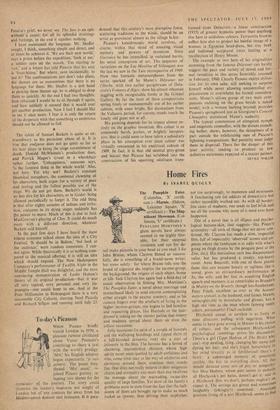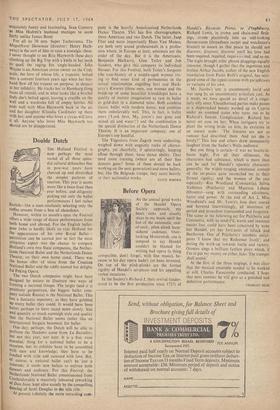Home Fires
QUIGLY
By ISABEL
PENELOPE MORTIMER'S
glum novels have always seemed to me highly film- able, for their external vividness and eye for de- tail make pictures in your head as you read. Like John Braine, whom Clayton filmed so success- fully, she is something of a brand-name writer, but more subtly: for where Braine tells you the brand of cigarette she implies the income-group, the background, the origins of each object, house or life. Jack Clayton has again had a field-day of social observation in filming Mrs. Mortimer's The Pumpkin Eater, a novel about marriage and motherhood likely to send anyone contemplating either straight to the nearest nunnery; and as his camera lingers over the artefacts of living in the higher income-groups, one begins to feel familiar and reassuring places, like Harrods or the hair- dresser's, taking on the sinister patina that misery and madness spread about them on even the jolliest occasions.
Jolly occasions (in spite of a couple of funerals and the walloping handbags and ripped shirts of a full-blooded domestic row) are a sort of leitmotiv in the film. The heroine has a brood of charming, uncontrolled children whose high spirits never seem quelled by adult awfulness and who, come what may in the way of adulteries and abortions around them, continue their rowdy fun. One does not really believe in their enigmatic charm and normality any more than one swallows the message about the marauding, locust-like quality of large families. Yet most of the family's problems seem to stem from the fact that the half- dozen of them are brought up to make as much racket as twenty, thus driving their stepfather,
not too surprisingly, to mammon and mistresses. A fascinating tale for addicts of domesticity but rather incredibly worked out. As with all border- line cases of madness, one tends to feel bfisk and see all the reasons why none of it need ever have happened.
Out of a novel that is all ellipsis and psycho- logical banana-skin, that suggests—like Pinter's screenplay—all sorts of things that are never con- firmed, Mr. Clayton has made a slow, respectful film, full of impeccably 'observed' scenes and set- pieces where the landscape is at odds with what's going on (high drama by the penguin pool at the Zoo, etc.). I-Es meticulous care has documentary value, but has produced a creaky, top-heavY result. Anne Bancroft, with one of those plastic faces that can assume beauty or ugliness like a mood, gives an extraordinary performance as Jo, the wife, and her feat in acquiring English speech and manners is as remarkable as Brando's in Mutiny on the Bounty, though less flamboyant. Peter Finch, excellent as ever as the homme moyen sensuel, is the husband, and James Mason, unrecognisable in moustache and glasses, has a high old time as the man whom (among manY others, presumably) Finch cuckolds. Hitchcock casual or careless is as lively as most directors pulling with eagerness. What seems to have gone wrong in Mamie is his choice of subject, and the subsequent Hitchcockiaa psychological rumblings prove his discomfort. There's a girl (Tippi Hedren of The Birds) who can't stop stealing, lying, changing her nainf and dyeing her hair; and she's frigid. Somewhere in her mind (exactly as in Spellbound) there's a block : a submerged memory of something terrible, the key to .everything since. All this should demand some sort of pity or sympathy: but Miss Hedren, whose part seems to embodY all Hitchcock's pet hates, doesn't get it; and In a Hitchcock film we don't, perhaps oughtn't to, expect it. The settings are glossy and sometinins laughably (jokingly?) contrived: American gracious living of a sort Hitchcock seems to find 'exquisitely funny and fascinating. Sean Connery ' as Miss Hedren's husband manages to seem' fairly unlike James Bond.
For all its 70 mm. Super Technirama, The Magnificent Showman (director: Henry Hath- away) is the sort of film to raise a nostalgic cheer. I never thought to see Rita Hayworth these days climbing up the Big Top with a knife in her teeth to quell the raging fire single-handed. John Wayne is an American circus owner on the Cody scale, the love of whose life, a trapezist, bolted into a convent fourteen years ago when her hus- band flew off his trapeze on purpose, in despair at her infidelity. He tracks her to Hamburg (long faces all round), and in what looks like a brothel finds she's bolted again, leaving a crucifix on the wall and a wardrobe full of empty bottles. All ends well with Miss Hayworth back in the air and her daughter (Claudia Cardinale) up there With her; and anyone who loves a circus will love it all. Anyone who loves Miss Hayworth too Should not be disappointed.

























 Previous page
Previous page